Home » New York
Pharmacy Schools in New York - 2025
 The 4th most populous state in the nation with a population of over 19 million, New York offers a galore of opportunities to its pharmacists. There is a steady demand for pharmacists in the state, particularly in New York City that is home to some big pharmaceutical companies. As of 2021, NY has around 18,680 pharmacists, earning an average annual salary of $128,260, playing varied roles in the pharmaceutical industry. To join this workforce you must complete your Pharm. D. Program from any of the ACPE accredited pharmacy schools in New York. To start with, we have ranked accredited pharmacy schools in the state, based on their NAPLEX performance.
The 4th most populous state in the nation with a population of over 19 million, New York offers a galore of opportunities to its pharmacists. There is a steady demand for pharmacists in the state, particularly in New York City that is home to some big pharmaceutical companies. As of 2021, NY has around 18,680 pharmacists, earning an average annual salary of $128,260, playing varied roles in the pharmaceutical industry. To join this workforce you must complete your Pharm. D. Program from any of the ACPE accredited pharmacy schools in New York. To start with, we have ranked accredited pharmacy schools in the state, based on their NAPLEX performance.
Our Ranking Methodology
Our ranking methodology mainly comprises of evaluating each school for its NAPLEX first time pass rates. As we understand NAPLEX being an important milestone in your journey towards becoming a licensed pharmacist, evaluating a school's success at the licensure exam goes to indicate the quality of its faculty and the education it offers. Each school was looked into for its NAPLEX performance in the last four years, with 40% weightage given to 2021, 30% to 2020, 20% to 2019 and 10% to 2018.
| NAPLEX Pass Rate Year | Weightage |
| 2018 | 10% |
| 2019 | 20% |
| 2020 | 30% |
| 2021 | 40% |
2025 Ranking of ACPE Accredited Pharmacy Schools in New York
#1. University at Buffalo
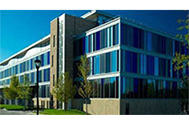
Ranking Score: 93.97%
Location: Buffalo
Accreditation: ACPE
Program Length: 4 Years
About the College: State University of New York at Buffalo's School of Pharmacy and Pharmaceutical Sciences was founded in 1886, which makes it one of the oldest pharmacy colleges in New York. It is one of the only pharmacy schools in the U.S. to make classes that focus on the role genes play in determining individuals' responses to drugs a mandatory part of the curriculum.
| University at Buffalo NAPLEX Performance | ||
| Year | # of Students Attempted | Pass Rate |
| 2018 | 122 | 96.72% |
| 2019 | 124 | 92.00% |
| 2020 | 113 | 97.00% |
| 2021 | 111 | 92.00% |
#2. St John Fisher College
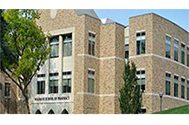
Ranking Score: 89.96%
Location: Rochester
Accreditation: ACPE
Program Length: 4 Years
About the College: Though St. John Fisher was founded by Catholic Basilian Fathers, the College now describes itself as an independent institution in the "Catholic tradition of American higher education." The Wegmans School of Pharmacy admits students of all religious denominations into its Pharm.D. program.
Program Details: Wegmans School of Pharmacy's Pharm.D. program is a four-year program. Applications must be made through the Pharmacy College Application service; in addition to completing the necessary academic prerequisites, applicants must take the Pharmacy College Admissions Test and pass a criminal background check. Clinical rotations commence in the summer between the second and third year and make up a full 30 percent of the Pharm.D. curriculum. The fourth year is comprised entirely of experiential learning opportunities that build on concepts and skills learned in the previous three years. Pharm.D. students also have the opportunity to participate in medical mission service trips to El Salvador, Honduras and India.
| St John Fisher College NAPLEX Performance | ||
| Year | # of Students Attempted | Pass Rate |
| 2018 | 78 | 93.60% |
| 2019 | 78 | 97.00% |
| 2020 | 74 | 88.00% |
| 2021 | 74 | 87.00% |
#3. Albany College of Pharmacy
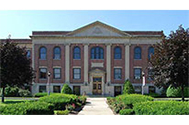
Ranking Score: 85.26%
Location: Albany
Accreditation: ACPE
Program Length: 4 Years
About the College: "The Wall Street Journal" called Albany College of Pharmacy and Health Sciences the top value-added educational opportunity in the country. The College sponsors a pharmacy in Albany and a pharmacy in Schenectady that are completely operated by students.
Program Details: Students can be admitted to either the six-year Early Assurance Pharm.D. track straight out of high school, or they may enter the first year of the professional four-year Pharm.D. curriculum. State-of-the-art technology helps simulcast the same lectures to Albany College's campuses in New York and Vermont. Clinical rotations at more than 600 community pharmacies, hospitals, ambulatory care clinics and research laboratories across the northeast make up 30 percent of the Pharm.D. curriculum. The College also offers students experiential opportunities in international pharmacy settings such as Italy, Switzerland and Japan.
| Albany College of Pharmacy NAPLEX Performance | ||
| Year | # of Students Attempted | Pass Rate |
| 2018 | 212 | 89.62% |
| 2019 | 198 | 91.00% |
| 2020 | 195 | 83.00% |
| 2021 | 168 | 83.00% |
#4. St Johns University
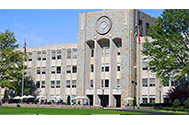
Ranking Score: 83.07%
Location: Queens
Accreditation: ACPE
Program Length: 4 Years
About the College: St John's University is Roman Catholic institution of higher learning that aims to inspire students to greater social involvement. However, students from many different religious backgrounds pursue Pharm.D. degrees in New York at the University's College of Pharmacy and Health Sciences.
Program Details: The University's Pharm.D. program is typically a six-year program that commences when aspiring pharmacists are still undergraduates. In the first year of the four-year professional program, academic coursework switches focus from liberal arts to applied clinical and pharmaceutical sciences. Clinical rotations take place at more than 180 sites throughout the greater New York City metropolitan region. The University also offers study abroad experiences in Rome and in Paris. At the beginning of their third year of Pharm.D. training, all students must obtain a New York State Pharmacy Intern Permit and purchase malpractice insurance through the University.
| St Johns University NAPLEX Performance | ||
| Year | # of Students Attempted | Pass Rate |
| 2018 | 203 | 83.70% |
| 2019 | 238 | 86.00% |
| 2020 | 224 | 85.00% |
| 2021 | 195 | 80.00% |
#5. Touro New York College of Pharmacy
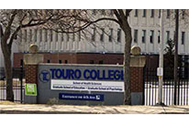
Ranking Score: 80.91%
Location: New York City
Accreditation: ACPE
Program Length: 4 Years
About the College: Touro New York College of Pharmacy caps the size of each entering class at 100 so that students will have the benefit of personal attention and mentoring relationships with faculty members. One of the College's primary goals is to increase access to health care in under-resourced communities.
Program Details: Touro New York College of Pharmacy's 2.5+1.5 Pharm.D. curriculum provides two and a half years of highly structured classroom learning experiences, and a year and a half of clinical rotations. Students end up serving nine rotations at hospitals, drug stores and community clinics throughout New York City. You do not have to have an undergraduate degree to apply to this program so long as you have taken the prerequisite coursework. Applications must be made through the Pharmacy College Admissions Service.
| Touro New York College of Pharmacy NAPLEX Performance | ||
| Year | # of Students Attempted | Pass Rate |
| 2018 | 53 | 81.13% |
| 2019 | 76 | 73.00% |
| 2020 | 67 | 78.00% |
| 2021 | 46 | 87.00% |
#6. D'Youville College
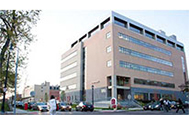
Ranking Score: 76.63%
Location: Buffalo
Accreditation: ACPE
Program Length: 4 Years
About the College: D'Youville College's School of Pharmacy was affiliated with the Roman Catholic Church when it was first founded but is now an independent college. The College is known for its high-quality health care education. It offers degree programs for physician assistants, nurses, chiropractors and physical therapists as well as for pharmacists.
Program Details: The School of Pharmacy's Pharm.D. curriculum stresses the importance of interdisciplinary collaboration so that students will learn the importance of working together as part of a health care team. Applications must be submitted through the Pharmacy College Admission Service, and applicants are required to take the Pharmacy College Admissions Test. Students start pharmacy practice experiences the first semester they're enrolled in the Pharm.D. program, and over the course of the four-year program, they will complete more than 1,780 hours of clinical rotation. The fourth and final year of the program is entirely comprised of clinical rotations.
| D’Youville College NAPLEX Performance | ||
| Year | # of Students Attempted | Pass Rate |
| 2018 | 66 | 80.30% |
| 2019 | 68 | 84.00% |
| 2020 | 59 | 70.00% |
| 2021 | 31 | 77.00% |
#7. Long Island University
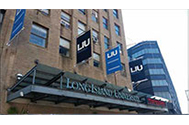
Ranking Score: 72.90%
Location: Brooklyn
Accreditation: ACPE
Program Length: 4 Years
About the College: Long Island University's College of Pharmacy traces its root back to1886 as the oldest unit of LIU. Officially affiliated with the university in 1929, LIU Pharmacy is the first and Brooklyn's only pharmacy school in the city. It offers 8 medical-related academic programs and is affiliated with more than 65 elite clinical sites and has over 400 professional preceptors.
About the Program: The 6-year Pharm.D. Program offered at LIU Pharmacy comprises of 2-year preprofessional phase courses in general education and 4-year professional studies with core pharmaceutical coursework. Entire curriculum is delivered through didactic classroom lectures, lab work, and experiential education from introductory to advanced level at different pharmacy practice settings. Successful completion of this program will open the doors to entry-level positions as a pharmacist in a healthcare setting where you would be capable to effectively distribute prescribed and non-prescribed medication and provide extensive patient-care services.
| Long Island University NAPLEX Performance | ||
| Year | # of Students Attempted | Pass Rate |
| 2018 | 187 | 85.03% |
| 2019 | 178 | 75.00% |
| 2020 | 185 | 78.00% |
| 2021 | 160 | 65.00% |
Typical Pharm.D. Program Details in NY
Why Should I Apply for an ACPE Accredited Pharm.D. Program?
The ACPE establishes education standards which the accredited schools are required to keep up with. When you enroll in any of the accredited pharmacy schools in NY, you can be rest assured of receiving education that is of high quality and at par with any of the recognized schools in the country.
Program Length
A Pharm. D. program, on its own takes 4 years to complete. However when we consider the pre-pharmacy requisites, you must add another two to four years of college study. So, in all it will take six to eight years of study to complete your Doctor of Pharmacy.
Tuition
To complete your pharmacy education in New York, you will require shelling out some extra bucks as tuition costs in the state are steeper as compared to pharmacy schools in most other part of the country. Overall tuition costs in NY ranges between $103,476, on the lower side and $186,312 on the higher end.
Admission Requirements
Before you get ready for your admission, it is prudent to know the basic admission requirements that entail your enrollment into a pharmacy school. However, in-detail admission requirements may differ, so you must check with the admission officer of your college. Broadly, four basic requirements for a Pharm. D. Program are:
• Complete the required Pharm. D. pre-requisite courses
• Take the PCAT exam
• Obtain two/three letters of reference
• Participate in Community Service
Curriculum
While the curriculum of Doctor of Pharmacy programs in New York may not be exactly the same, getting a sneak peek into it, you shall know what to expect. The coursework usually spans across four years and integrates physiology, medicinal chemistry, and pharmacology. You also get the much-needed hands on experience early into your academic tenure where you can hone the newly acquired knowledge and skills by working at various experiential pharmacy sites. Over the course of the 1 st and 2 nd year, you will go through four IPPEs and the entire fourth will be spent taking you through Advanced Pharmacy Practice Experiences in various kinds of practice settings. The table below is the sample curriculum of St John Fisher College.
Sample Curriculum
| First Professional Year (P1) | Second Professional Year (P2) |
| Introduction to Pharmacy Profession | Applied Pharmaceutics I |
| IPE: Team STEPPS | Communications and Counseling Skills |
| Pharmacy Calculations | Introductory Pharmacy Practice Experience I |
| Principles, Methods & Clinical Application of Epidemiology in Pharmacy Practice I | Systems Pharmacology III |
| Pharmaceutics I | Applied Pathophysiology and Therapeutics I |
| Systems Pharmacology I | Health Care Delivery |
| Biosystems I | Applied Pharmaceutics II |
| IPE: Team Stepps | Principles, Methods & Clinical Application of Epidemiology in Pharmacy Practice II |
| Introduction to Diversity | Systems Pharmacology IV |
| State Pharmacy Law | Applied Pathophysiology and Therapeutics II |
| Biosystems II | Introductory Pharmacy Practice Experience II |
| Pharmaceutics II | |
| Systems Pharmacology II | |
| Self Care & Natural Products | |
| Third Professional Year (P3) | Fourth Professional Year (P4) |
| Population Based Health Care | APPE Elective I |
| Critical Evaluation of Medical Literature I | APPE Elective II |
| Introductory Pharmacy Practice Experience III | APPE Elective III |
| Concepts in Pharmacy Practice I | APPE Core Community |
| Systems Pharmacology V | APPE Core Health-System |
| Applied Pathophysiology and Therapeutics III | APPE Core Acute Care |
| Federal Pharmacy Law | APPE Core Ambulatory Care |
| Critical Evaluation of Medical Literature II | |
| Introductory Pharmacy Practice Experience IV | |
| Ethics in Pharmacy Practice | |
| Managing Practice and Personnel | |
| Concepts in Pharmacy Practice II | |
| Applied Pathophysiology and Therapeutics IV |
Licensure - Passing the NAPLEX, MPJE & Compounding-Written and Practical in New York
To become a licensed pharmacist in the state of NY, you are required to pass 3 licensing exam series within 5 years of your graduation. The 3 licensing exams are:
NAPLEX: To be eligible to take the NAPLEX you are required to apply to the New York State Education Department . Once the department confirms your eligibility you can apply to the NABP for the exam.
MPJE: For this exam too, once New York State verifies your eligibility you can apply online through the NABP and the take the exam.
Compounding-Written and Practical: The eligibility criterion for this exam is same as the MPJE. This state administered exam, is specific to New York State. You must schedule your exam by submitting your fee online.
New York Pharm. D. Graduates NAPLEX Performance (2018-2021)
Number of pharmacy students taking the NAPLEX over the last four years has nearly been the same; however the performance has dropped in 2016 and 2017. While in 2018 and 2019, students did exceedingly well, passing the NAPLEX with a 87.16% and 85.43% respectively. In the recent 2020 and 2021, the pass rates of 82.71% and 81.57% were lower than the national average.
| School | Location | 2018 | 2019 | 2020 | 2021 | ||||
| #Taken | Pass % | #Taken | Pass % | #Taken | Pass % | #Taken | Pass % | ||
| University at Buffalo | Buffalo | 122 | 96.72% | 124 | 92.00% | 113 | 97.00% | 111 | 92.00% |
| St John Fisher College | Rochester | 78 | 93.60% | 78 | 97.00% | 74 | 88.00% | 74 | 87.00% |
| Albany College of Pharmacy | Albany | 212 | 89.62% | 198 | 91.00% | 195 | 83.00% | 168 | 83.00% |
| St Johns University | Queens | 203 | 83.70% | 238 | 86.00% | 224 | 85.00% | 195 | 80.00% |
| Long Island University | Brooklyn | 187 | 85.03% | 178 | 75.00% | 185 | 78.00% | 160 | 65.00% |
| D'Youville College | Buffalo | 66 | 80.30% | 68 | 84.00% | 59 | 70.00% | 31 | 77.00% |
| Touro New York College of Pharmacy | New York City | 53 | 81.13% | 76 | 73.00% | 67 | 78.00% | 46 | 87.00% |
| Overall New York NAPLEX Performance | 921 | 87.16% | 960 | 85.43% | 917 | 82.71% | 785 | 81.57% | |
How Much Do Pharmacists Make in New York?
A pharmacist in New York makes an average annual salary of $128,260, which 2% more than the national average. A pharmacist working in Ithaca earns the highest salary in the state by taking home an annual pay check of $132,750. Part-timers in the state earn an annual wage of $61.66.
| Type | Salary |
| Hourly | $61.66 |
| Monthly | $10,690 |
| Annual | $128,260 |
| Source: U.S. Bureau of Labor Statistics |
Pharmacist 10-Year Job Outlook in New York
The employment growth rate of a pharmacist in NY is projected to be 10.13% in negetive through 2020 to 2030, considering the national growth rate being at 2.14% in negative. By 2030, there will be around 22,280 pharmacists working in the state. Each year there will be 1,000 job openings for pharmacists to fill up new as well as replacement positions.
| 2020 Employment | 2030 Employment | Growth | Projected Annual Job Openings (New + Replacement) | |
| Number | Percent | |||
| 20,230 | 22,280 | 2,050 | 10.13% | 1,000 |
| Source: Career One Stop | ||||
Also Check Out